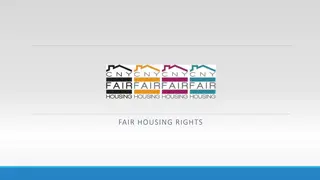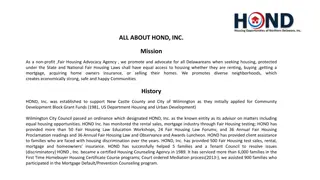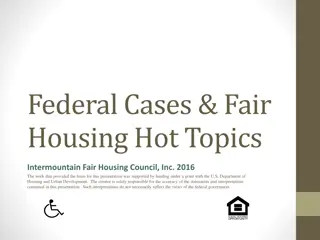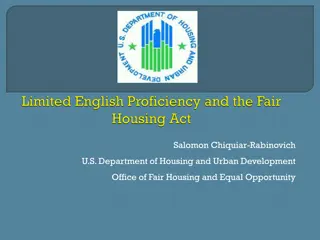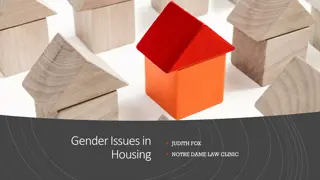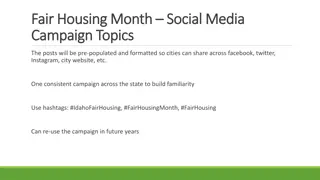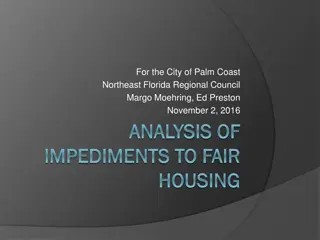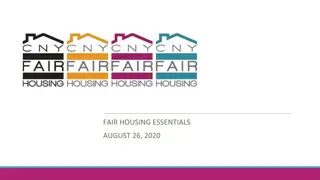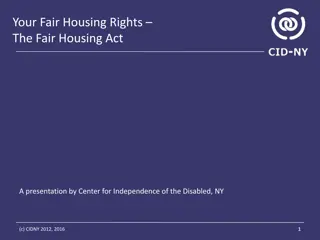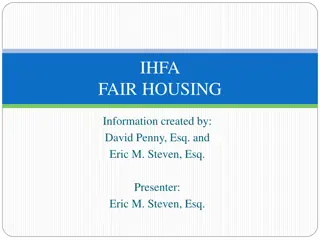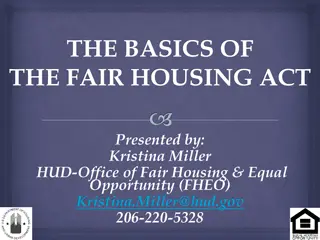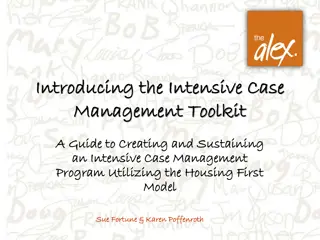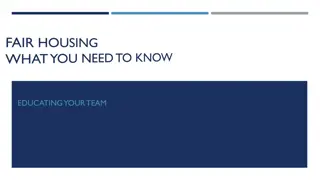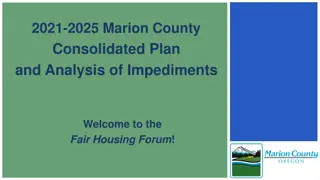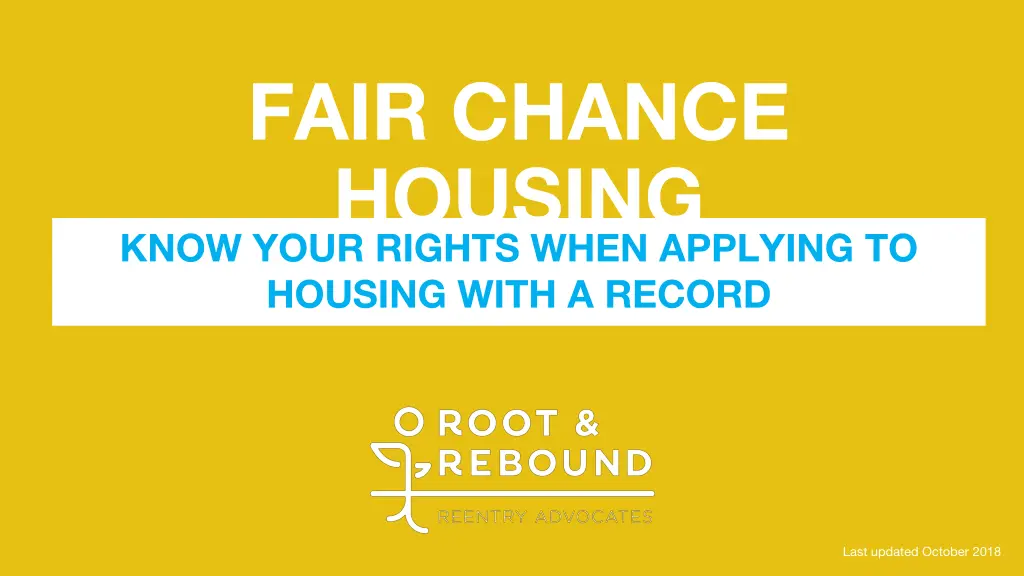
Fair Chance Housing Guide: Applying with a Record
Discover your rights when applying for housing with a criminal record. Learn steps to challenge denials, know your housing types, and access resources for a fair chance at housing. Get the information you need to navigate the process effectively.
Download Presentation

Please find below an Image/Link to download the presentation.
The content on the website is provided AS IS for your information and personal use only. It may not be sold, licensed, or shared on other websites without obtaining consent from the author. If you encounter any issues during the download, it is possible that the publisher has removed the file from their server.
You are allowed to download the files provided on this website for personal or commercial use, subject to the condition that they are used lawfully. All files are the property of their respective owners.
The content on the website is provided AS IS for your information and personal use only. It may not be sold, licensed, or shared on other websites without obtaining consent from the author.
E N D
Presentation Transcript
FAIR CHANCE HOUSING KNOW YOUR RIGHTS WHEN APPLYING TO HOUSING WITH A RECORD Root Rebound Last updated October 2018
WHAT IS IT? Fair Chance Housing means that people with criminal records should not have to experience additional barriers to accessing housing because FAIR CHANCE HOUSING of their record.
WHY ITS IMPORTANT 1/3 ALL 50 STATES AND D.C. HAVE A SHORTAGE OF AFFORDABLE HOUSING AMERICANS HAVE A CRIMINAL RECORD
OVERVIEW HOUSING TYPES THE DIFFERENCE BETWEEN PRIVATE AND FEDERALLY ASSISTED HOUSING FAIR HOUSING FEDERAL FAIR HOUSING LAWS & YOUR HOUSING RIGHTS BACKGROUND CHECKS CAN A LANDLORD ASK ABOUT YOUR CRIMINAL RECORD? CHALLENGING ILLEGAL DENIALS WHAT TO DO IF YOU RE ILLEGALLY DENIED HOUSING
OVERVIEW CHECKLIST OF ACTION STEPS ADDITIONAL RESOURCES
DISCLAIMER This training does not provide legal advice, but rather provides general legal information. No attorney- client relationship is created with Root & Rebound by using any information in this training. If you are looking for legal advice specific to your situation, you should consult and retain your own attorney. Root & Rebound offers this training template as-is and makes no representations or warranties of any kind concerning the toolkit, express, implied, statutory, or otherwise, including, without limitation, warranties of accuracy, completeness, title, marketability, merchantability, fitness for a particular purpose, noninfringement, or the presence or absence of errors, whether or not discoverable. In particular, Root & Rebound does not make any representations or warranties that this training, or any information in this training , is accurate, complete, or up-to-date, or that it will apply to your circumstances. If you use information from the training, it is your responsibility to make sure that the law has not changed and applies to your particular situation.
APPLYING TO HOUSING WITH A RECORD A STEP-BY-STEP GUIDE
BEFORE YOU START STEP ONE: Read the toolkit/watch the training videos! STEP TWO: Find out what s on your record. STEP THREE: Find out what on your record you can get cleaned up. STEP FOUR: Gather evidence showing rehabilitation and how your life has changed.
APPLYING FOR HOUSING STEP ONE: Know your rights BEFORE you apply! STEP TWO: Find out who to apply to (Public Housing Agency for federally assisted housing, or directly to private housing). STEP THREE: Fill out the housing application.
IF YOU ARE DENIED HOUSING STEP ONE: Ask why you were denied. STEP TWO: If you think you were illegally denied housing: File a complaint to the Department of Housing and Urban Development (HUD) and your state fair housing agency; Contact a lawyer; and/or If you were denied federal housing: ask for a review hearing.
DECIDING ON HOUSING STEP ONE: Decide whether you need short-term/ transitional housing or permanent housing. STEP TWO: Find out if you qualify for federally assisted housing. STEP THREE: Look through resources for private housing seekers.
HOUSING TYPES PRIVATE HOUSING FEDERALLY ASSISTED HOUSING
PRIVATE HOUSING is owned and operated by a private landlord (a corporation, non-profit, or individual), NOT the government. Private housing can be: >MARKET-RATE >AFFORDABLE NOT limited to low low-income applicants Limited to low-income applicants
FEDERALLY ASSISTED HOUSING is owned, operated, or managed by the federal government Federally assisted housing can ONLY be: > AFFORDABLE Limited to low-income applicants
FEDERAL HOUSING PROGRAMS FEDERALLY ASSISTED HOUSING Public housing program Section 8 voucher program Project-based section 8 housing Section 8 moderate rehabilitation program Section 202 housing (for elderly) Section 811 housing (for individuals with disabilities) Section 221(d)(3) housing (Multi-family Rental Housing for Moderate-Income Families) Section 236 housing (preservation program) Section 514 or 515 (rural housing) PRIVATE HOUSING Low Income Tax Credit Housing Shelter Plus Care Supportive Housing program Housing Opportunities for Persons with AIDS (HOPWA)
YOUR RIGHT NOT TO BE DISCRIMINATED AGAINST REASONABLE ACCOMMODATIONS FOR PEOPLE WITH DISABILITIES OVERBROAD CRIMINAL RECORD BANS FAIR HOUSING
! NOTE: This training discusses the federal Fair Housing Act and the U.S. Department of Housing and Urban Development s guidance on the use of criminal records. This is FEDERAL information. It applies to all 50 states and D.C. But keep in mind that your state or local government might have additional protections for people seeking housing! No matter where you live, it is important to check your state and local law.
KNOW YOUR RIGHTS! Under the federal Fair Housing Act, you have the right NOT to be discriminated against when you apply for housing based on the following protected classes: Race Color National origin Religion Sex Disability
NOTE on DISABILITY 1 of the 7 federal protected classes Disability includes: Physical disabilities like deafness, blindness, mobility limitations Mental & intellectual disabilities Past drug or alcohol addiction Current alcoholism
KNOW YOUR RIGHTS! Reasonable Accommodation: A change in rule or practice necessary to allow person with a disability equal opportunity to use & enjoy housing Landlords are required to provide you with a reasonable accommodation if requested Must be reasonable AND necessary
HUD GUIDANCE In 2016 HUD issued guidance on how FHA applies to use of criminal history. It explains how criminal history should and should not be used by landlords when deciding whether to approve housing applications.
KNOW YOUR RIGHTS! According to the FHA & HUD Guidance, a landlord can t: Deny you housing based only on an arrest record Deny you housing because of a criminal conviction or specific type of criminal conviction without taking into account when the conviction occurred, what the underlying conduct entailed, or what you have done to improve your life since Treat applicants with criminal records differently
FEDERALLY ASSISTED HOUSING LEGALLY REQUIRED BANS CONVICTION or ACTIVITY BANNED FROM FOR HOW LONG CONVICTED of methamphetamine production on federally assisted property Public housing Section 8 Housing Choice Voucher program Section 8 Moderate Rehab program LIFETIME CONVICTED of sex offense requiring lifetime registration All federally assisted housing LIFETIME PAST EVICTION from federally assisted property due to drug- related activity Public housing Section 8 Housing Choice Voucher program Section 8 Moderate Rehab program 3 YEARS Currently USING illegal drugs All federally assisted housing As long as you re currently using + reasonable time after illegal drug use
ALL HOUSING OTHER LEGAL GROUNDS FOR DENIAL Drug-related criminal activity Violent criminal activity Threat to health, safety or peace of other residents, the owner or public housing agency employees Private landlord should + federally assisted landlord MUST consider mitigating information & proof of your rehabilitation
ILLEGAL DENIALS BLANKET BANS Arrest history Criminal record Specific convictions without considering the specific facts of your situation DISPARATE IMPACT Legal reason for denial BUT impacts one race (or other protected class) more than others CRIME FREE HOUSING PROGRAMS YOU SHOULD IMMEDIATELY CONTACT A FAIR HOUSING OR LEGAL SERVICES ORGANIZATION NEAR YOU TO REPORT ANY SUCH DENIALS!
BACKGROUND lCHECKS SOURCES OF CRIMINAL RECORD INFORMATION
SOURCES of CRIMINAL RECORD INFO All landlords both FEDERALLY ASSISTED & PRIVATE can get your background information from: Your housing application Private background check or tenant screening companies Public court records The Internet
SOURCES of CRIMINAL RECORD INFO Only PHAs can also get your information from: The National Crime Information Center State and local police departments & other law enforcement agencies Other PHAs ONLY for Public Housing - drug treatment facilities* *only to ask about reason to believe you re currently using illegal drugs
FAIR CHANCE HOUSING ORDINANCES Ban the Box: cannot ask about criminal record on a housing application Anti-Discrimination: criminal record added as protected class If you live in: City of Champaign, IL* City of Seattle, WA* City of Urbana, IL If you live in: City of Newark, NJ City of Richmond, CA City & County of San Francisco, CA District of Columbia *some exceptions apply for certain convictions
KNOW YOUR RIGHTS! If your city or county does NOT have an ordinance prohibiting landlords from asking about your criminal record when you apply for housing You can be asked about your criminal record on your housing application. The landlord MUST ask EVERYONE equally about their criminal record. For example, they can t only ask applicants of a certain race or sex or other protected category.
KNOW YOUR RIGHTS! If you are denied housing because of information in your background check, you have a right to: Know WHY your housing application was denied The name, address, & telephone number of the company that did the check Ask for a FREE copy of your background check from the company Correct any errors with BOTH the landlord & the company
CHALLENGING HOUSING DENIALS IN FEDERALLY ASSISTED HOUSING IN PRIVATELY OWNED HOUSING
FEDERALLY ASSISTED HOUSING REVIEW HEARING Informal (not court) process You can challenge your denial With PHA *Available only if you applied for and were denied federally assisted housing
KNOW YOUR RIGHTS! Review Hearing Right to bring a lawyer (NOT right to be given a lawyer) Right to be heard before impartial, unbiased officer Right to state why you should not have been denied, including proof of rehabilitation or mitigating circumstances Right to explain circumstances of past conviction Right to ask witness questions Right to a written decision after hearing
What is Proof of Rehabilitation? Information & evidence that you have changed & improved since the time of your offense or criminal conduct. Documents showing you have completed parole, probation, or other supervision Certificates or diplomas for education you have received Documentation of completing alcohol or drug treatment programs Letters of support or recommendations
What are Mitigating Circumstances? Extra information & evidence explaining the offense or conduct is not as negative as it seems, by showing: A long time has passed since offense or conviction You were young when you were convicted You were not involved in the conduct as it seems or there was abuse, coercion or mental illness that led to the conduct Any other factors that help explain the circumstances & why it should be viewed leniently
PRIVATE HOUSING No review hearing process BUT Contact local fair housing or legal services organization File complaint with local HUD office or state fair housing commission
CHECKLIST Preparing for a review hearing: Make sure you have written explanation of your denial BEFORE the hearing! Don t miss any deadlines! Ask the PHA or owner for all documents & information related to your housing denial. Gather information to show the PHA why should not be denied housing. Proof of rehabilitation Proof of mitigating evidence
CHECKLIST If you think you ve been illegally denied housing: Contact a fair housing or legal services organization near you. Start by contacting your city or county s housing department or local PHA to ask for referrals to local fair housing and/or legal services organizations in your community. Find the closest free Legal Aid office near you at www.lsc.gov/what-legal-aid/find-legal-aid See Section V: Additional Resources of the Fair Chance Housing Toolkit for national organizations who may be able to direct you to other resources in your state or community. File a complaint with your local HUD office or state fair housing commission. Find your local HUD office by visiting www.hud.gov/program_offices/fair_housing_equal_opp Find your state s fair housing commission by visiting www.nolo.com/legal-encyclopedia/state- fair-housing-agencies
ADDITIONAL RESOURCES FOR HOUSING SEEKERS FOR ADVOCATES
For Housing Seekers National HIRE Network | hirenetwork.org Contact at hirenetworkinfo@lac.org or (212) 243-1313 or (202) 544-5478 U.S. Department of Housing and Urban Development Find your local office at www.hud.gov.program_offices/field_policy_mgt/localoffices Contact at (202) 708-1112 or TTY (202) 708-1455 Equal Rights Center | equalrightscenter.org/our-programs/fair-housing Contact at info@equalrightscenter.org or (866) 719-4372 Legal Aid | Find an office near you at www.lsc.gov/what-legal-aid/find-legal-aid ACLU | Find an office near you at www.aclu.org American Bar Association | Find free legal help at www.findlegalhelp.org
For Advocates Litigation Resources Legal Aid | Find an office near you at www.lsc.gov/what-legal-aid/find-legal-aid Advocacy Resources National HIRE Network | hirenetwork.org Contact at hirenetworkinfo@lac.org or (212) 243- 1313 or (202) 544-5478 Shriver Center | www.povertylaw.org Contact at info@povertylaw.org or (312) 263-3830 Vera Institute | www.vera.org Contact at contactvera@vera.org or (212) 334-1300 National Housing Law Project | www.nhlp.org Contact at (415) 546-7000 Relman, Dane & Colfax | www.relmanlaw.com Contact at info@relmanlaw.com or (202) 728-1888 ACLU | Find an office near you at www.aclu.org NAACP Legal Defense Fund | www.naacpldf.org Contact at (212) 965-2200 American Bar Association | Find free legal help at www.findlegalhelp.org
CHECKLIST Know & Share! Download the Toolkit & review its Step-by-Step Guide Watch the Fair Chance Housing video trainings online at www.rootandrebound.org Find out if the housing you re applying for is private or public/federally assisted If applying for federally assisted housing - request a copy of your local PHA s eligibility policies Gather proof of mitigating evidence &/or proof of rehabilitation If denied housing + a background check was done, request a copy + review for errors
Because a criminal record should not be a life sentence For more information Contact Root & Rebound at info@rootandrebound.org (510) 279-2662 Root Rebound

